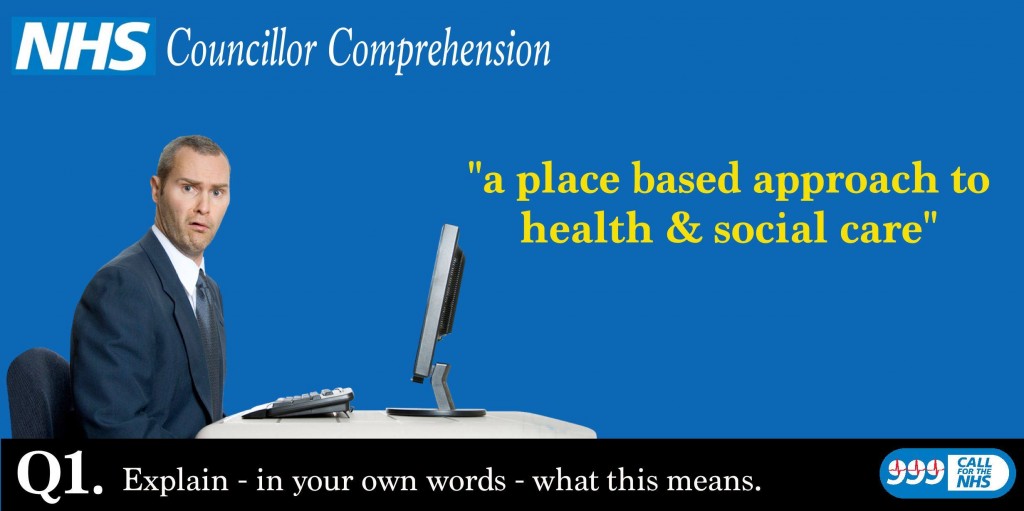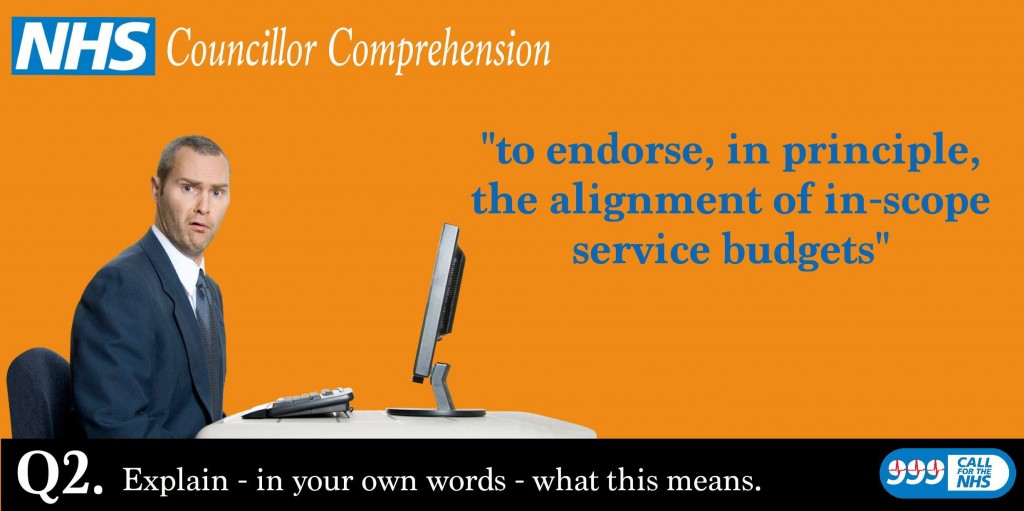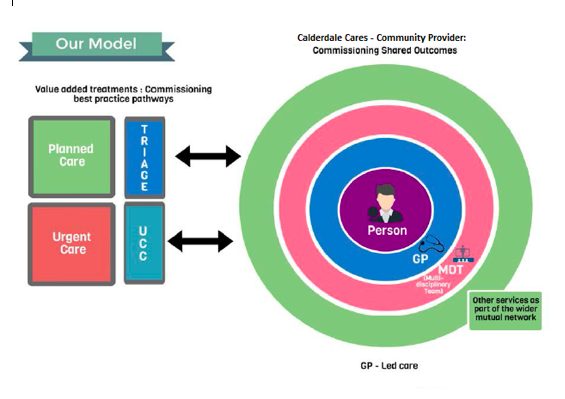Calderdale Council Cabinet has resolved that the Council will take more steps towards setting up an Accountable Care System to run local NHS and social care services.
Dubbed a “place based integrated health and care system”, it is due to be set up in shadow form in April and to go live in June 2019, according to a paper prepared for the 12.2.18 Cabinet meeting.
As the Cabinet resolved this issue in the meeting, Full Council will not debate or vote on it at its Meeting on 11th April.
Papers prepared for the Cabinet seem to have been written, in gobbledygook, by a student of Humpty Dumpty:
“When I use a word,” Humpty Dumpty said, in rather a scornful tone, “it means just what I choose it to mean- neither more nor less.”
“The question is,” said Alice, “whether you can make words mean so many different things.”
“The question is,” said Humpty Dumpty, “which is to be master-that’s all.”
Cabinet discussion at the 12.2.18 meeting was conspicuous by its absence
Cllr Bob Metcalfe welcomed NHS England’s rebranding of Accountable Care Systems as Integrated Care Systems. Cllr Jane Scullion said she had a problem with the word “Integration” but was happy with “cooperation and collaboration”. Cllr Barry Collins thought government had poisoned the word “integration.” The Clinical Commissioning Group Chief Officer Matt Walsh gushed that he was
“very happy with the tone of the conversation and language of cooperation and collaboration.”
All this from a Labour Cabinet, when the national and constituency Labour parties have voted overwhelmingly to oppose and stop Accountable Care Systems. Whatever is going on?
Councillors must explain to their constituents what the Council is doing
This is too vital an issue to trundle through without Councillors’ showing they fully understand what the Cabinet has recommended. Particularly since the Cabinet gave the (perhaps carefully cultivated) appearance of being wilfully unaware of what they are dragging our NHS and social care services into.
Upper Calder Valley Plain Speaker has prepared two online surveys for Councillors so they can test their understanding of this vital issue,and will publish Councillors’ responses to the surveys, if there are any. And if there aren’t, it will publish that too.
Please ask your Councillors to show they understand the Cabinet’s recommendations on this vital issue – that will affect everyone in Calderdale – by completing the online surveys ‘Councillors! Test your understanding of Calderdale Accountable Care System’ and ‘Councillors! Test your understanding of Cabinet’s recommendations on Calderdale Accountable System’.
Help is at hand! Here’s the downloadable (pdf) Councillors’ Rough Guide to Accountable Care Systems!
Here is where to find your ward councillors’ contact details.
The full Councillors’ Accountable Care System Comprehension Test is downloadable here (pdf)
What’s an Accountable Care System?
Calderdale Accountable Care System would carry out £100m cuts to NHS and social care spending in the area by 2020, and greatly increase NHS privatisation as new forms of care were introduced.
To start the process of making cuts, the Appendix to the paper for 12.2.18 Cabinet meeting states (para 7.1):
The Council, the CCG, CHFT and SWYPFT will immediately begin working together to adopt a shared approach to addressing the budget deficit across the whole system.
For “budget deficit”, read “government underfunding”.
Hospital services would be cut and centralised and their services replaced by new forms of primary and community care. These would be heavily reliant on costly digital technology and delivered by cheaper, less qualified and skilled grades of staff and volunteers, in hubs run by super practices that will serve around 30K-50K patients. These would replace traditional GP practices serving around 5K patients.
There is no national strategy for how community services will be resourced and organised in order to take this new load of work. Nor is there any real evidence that this will cut costs or provide an effective substitute for hospital care. NHS community services are currently under-resourced and in no position to take on this role. As this sector is the fastest-growing area of NHS privatisation, private companies are licking their lips and gearing up to take advantage of what one such company, Totally Ltd, has called
“a massive market opportunity”.
There will also be great reliance on voluntary sector workers, unpaid care from family and friends, self care and the “joint commissioning of preventive services” aiming at:
“a whole system approach where innovative integrated services focus on reduction in health inequalities, and the joint commissioning of preventative services deliver the most improvements to people’s health.” (para 4, Appendix to the 12.2.18 Cabinet paper)
Fine words – but let’s not take Humpty Dumpty at face value. All he cares about is who shall be master.
Humpty Dumpty’s plans for Integrated Wellness are a privatisation bonanza
Accountable Care Systems’ “partnerships” for public health and “health champions” to deliver “preventive” behaviour change programmes are going to be a privatisation bonanza. Contracts have already been scooped up by companies like Pulse Health Ltd (which describes the nature of its business as 78200 – Temporary employment agency activities) and Optum (a subsidiary of the US health insurance giant United Health – the former employer of the NHS England boss Simon Stevens).
To deliver these programmes,
“The Integrated Wellness Service will serve as a holistic approach to addressing the wider determinants of health such as wellbeing, healthy lifestyles, welfare and work/learning skills” (Appendix to the 12.2.18 Cabinet paper)
But wellbeing and healthy lifestyles skills are NOT the “wider determinants of health”: these are social, economic and environmental structures and practices that are largely outside the control of individuals. To allege otherwise is to collude with the neocon agenda of blaming the poor, ill and vulnerable for their poverty, illness and other aspects of vulnerability.
Unless I am mistaken (always a possibility and happy to be corrected) the reference to welfare and work/learning skills looks like enforcement of the government’s work-is-a-health outcome schemes, whereby people with long term illnesses start finding their health care is mixed up with DWP pressure to get a job. Disabled People Against Cuts have found that blurring the boundaries between the DWP and the NHS results in coercion.
Funding for privatised behaviour change/social control programmes will come from “redistributing resources from secondary to community and primary care”, according to Humpty Dumpty’s Cabinet Appendix.
That will be more NHS money taken out of our already under-resourced, crisis-ridden hospitals, to go into private company profits. Private companies like Totally Ltd are rubbing their hands over this “massive market opportunity”
More on Humpty Dumpty’s plans for Integrated Wellness coming soon – please come back later to find the link.
Calderdale Accountable Care System: a Multispeciality Community Provider
Calderdale’s Accountable Care System – like all the others – would be based on a public/private business model imported from the USA, where Accountable Care Organisations provide state-funded health insurance cover for a limited range of health care, for patients who are too poor or old to pay for private health insurance.
Importing this model means that many clinical decisions about appropriate treatments currently reached by the agreement of doctors and patients, would be replaced by financial decisions directed by the Accountable Care System. The upshot would be increasing restrictions to patients’ access to elective care . This would accelerate the development of a two tier system where those who can pay would go private, and the rest would be left with a limited NHS.
The governance process and care model proposed for the Calderdale Accountable Care System appear to be based on the Dudley Multispeciality Community Provider model – and the Appendix identifies the Dudley Alliance as the source of the model. However the Appendix leaves out the Multispeciality bit and refers to it as “A Community Provider: Commissioning Shared Outcomes.” (Appendix 3). More about this coming soon – please come back later to find the link.




Pingback: Wirral’s NHS crisis : petition to save five walk-in centres and other news from Defend Our NHS | Wirralleaks
hope you don’t mind, I’m not a councillor but I had a go at the survey.
I bookmarked this site a while back, and I’m glad I did!
Keep up the great work…
Gary
I hope it is possible to identify you Gary because this is meant for councillors and random responses by others will mess things up.
I was at the Cabinet meeting. It was stated quite clearly that there is no intention to support ACOs or any kind of privatisation.
Having said that I agree the paper needs looking at very carefully. I am not an expert in this but am totally against any move towards further privatisation as I am sure the majority of Labour Councillors are against this too. Quite rightly Labour Policy is against ACOs and for the full reinstatement of the NHS.
It is obviously complicated on a local basis when things have already moved in this direction and you have to deal with the CCG and keep services for people locally. We must do what we can locally to stop any further privatisation but quite frankly we need a Labour Government under Corbyn, commited to Reinstatement of a publically funded NHS free for all at the point of use. Many of us are working for this overtly through national campaigns and behind the scenes too. Carol (just speaking on behalf of myself!).
Thanks for your comment Carol. I agree that Cllr Tim Swift said that the plans under discussion are not about setting up an Accountable Care Organisation. However, they are very clearly about setting up a shadow Accountable Care System from April to run for a year before a period of evaluation and then to go live in June 2019. The models of care to be set up by an ACO or ACS are the same, the main significant difference is whether the contract is held by a single organisation or an alliance of commissioners and providers. NHS Improvement’s Board Meeting in Nov 2017 – having discusseed the 999 Call for the NHS Judicial Review of the Accountable Care Models contract – said that the structures are less important than the care models. If a Corbyn government were elected in 2022 or whenever it is, by then the NHS would be fragmented and locked into 15 year contracts that would be very difficult to deal with in any kind of NHS renationalisation. We can’t wait that long to protect the NHS.
re-“Unless I am mistaken (always a possibility and happy to be corrected) the reference to welfare and work/learning skills looks like enforcement of the government’s work-is-a-health outcome schemes, whereby people with long term illnesses start finding their health care is mixed up with DWP pressure to get a job. Disabled People Against Cuts have found that blurring the boundaries between the DWP and the NHS results in coercion”…..
I was talking to an American recently who said that Health Care in America is the biggest form of Social Control there is there. (for illustration watch the film ‘Beasts of the Southern Wild’)
Thank you, as ever, for this prodigious resource!